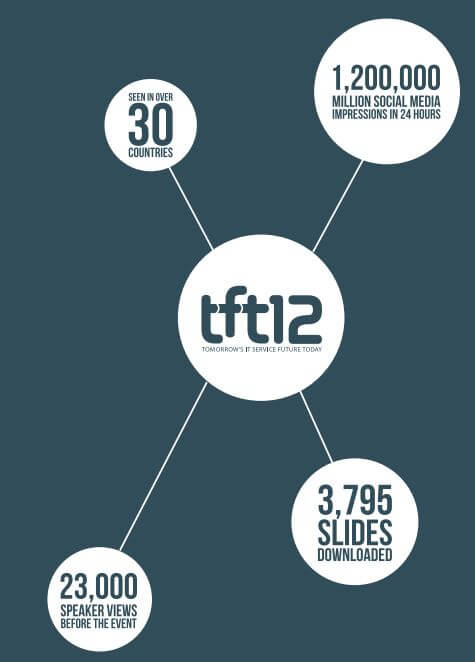(Editor’s Note: We’re thrilled to welcome Nick Kellet to TalentCulture as a guest blogger. For more information about Nick, see his profile at the end of this post.)
For many members of the TalentCulture community, there’s only one conference this week — SHRM13, the Society for Human Resource Management annual meeting in Chicago. But I’d like to focus on another conference that happens on Tuesday. It’s called TomorrowsFutureToday (TFT).
At first blush, TFT may not seem relevant. The topic is IT service management. But TFT’s business model deserves a closer look. Founder Chris Dancy is leading a movement to rethink every aspect of conference design and management — including how speakers are recruited, how content is created and shared, and how participants engage during live sessions and beyond.
This fascinating story lives at the intersection of social business, content strategy and technology. It’s a disruptive model that signals the growing power of crowdsourcing, expert networks and personal branding. It touches on many of the same issues and opportunities that are redefining the “world of work.” And from that perspective, it’s an inspiring example for TalentCulture.
Snapshot: What Sets TFT Apart
 TFT is a semi-annual, one-day “follow-the-sun” virtual conference, where 24 experts from around the globe speak for an hour each. Unlike classic conferences, the speakers are selected by professional practitioners and peers (via Listly). This replaces the “old-boy” model, where conference organizers control the agenda. Very cool.
TFT is a semi-annual, one-day “follow-the-sun” virtual conference, where 24 experts from around the globe speak for an hour each. Unlike classic conferences, the speakers are selected by professional practitioners and peers (via Listly). This replaces the “old-boy” model, where conference organizers control the agenda. Very cool.
Even cooler, all the speakers are paid. Yes, all of them. What’s more, the content “lives” long after the conference. Presentations are recorded and automatically converted into trans-media assets (slides, video, audio and transcribed text) that are reusable across a wide spectrum of digital channels. (This is accomplished via Zapier.)
- Speakers are encouraged to redistribute content anywhere they wish, indefinitely
- Access to all content is absolutely free to anyone who is interested, forever
- The overall event experience — before, during and after — has a big impact on its perceived value
- Similar to TED Conferences, the agenda development process ensures superior quality speakers and content. No pressure.
Implications for Personal Branding
The first TFT conference occurred in December 2012. That inaugural event demonstrated not only strong community engagement that won sponsorships, but also helped boost awareness and credibility of its speakers. Fact: since their appearance in December, half of the speakers have moved on to bigger and better professional roles.
So, what does that say about the power social media exposure, and its influence on personal brands? Chris Dancy took several moments to discuss this and several other related questions:
1) How do collaboration and social community relate to personal brand building?
“Collaboration and social community are the foundation of personal branding. Both depend on systems of attention, influence and altruism. Personal brands don’t transfer in hyper-digital economies without conscious consumption of community content. By serving the community first as a consumer, you then have the ability to understand the needs of that system. You have two ears, one mouth and 10 fingers — talent observes before it offers suggestion.”
2) Can you really crowdsource your way to a “brand” new career? How can others do so?
“I don’t believe you can crowdsource your ‘brand.’ You can crowdsource your values. If those values are stronger than the habits of a community, then your brand and career will reflect these systems. Others suffer from being overwhelmed by information, tech and connections. We must first teach people to make healthy tech and information choices. Healthy information diets are to the 2020’s what Tab cola was to the 1970’s.”
3) Did the speakers who landed new careers imagine this would be the outcome from a virtual conference culture?
“None of the speakers on TFT who transitioned to different careers imagined the vault in their careers. The speakers at TFT12 and TFT13 never considered it a virtual conference. In large part, speakers felt honored to be selected by their peers. It was that empowerment that moved their careers. To feel worthy of attention and time in a climate short on both, is the brand found inside of confidence and outside of hubris.”
The next LIVE round-the-clock event is tomorrow, Tuesday, June 18, 2013. Click here to follow the action in real time, or check back anytime to find content after-the-fact. You can also follow the conference backchannel at #TFT13.
In the meantime, let me know what you think about this business model. Could this work for your business domain? And how could you shape and enhance your personal brand while sitting in front of your computer?
Interesting questions — and enterprising people like Chris Dancy are helping us fill in the blanks. Share your ideas below, or connect with me on Twitter @NickKellet.
 (Author Profile: Nick Kellet is co-founder of social curation platform Listly. He believes that effective curation is as much about listening and engaging as it is about publishing and the tools themselves. A serial innovator who loves to jump domains from board games to business intelligence, Nick also believes that passion in the company of friends and community is an unstoppable force.
(Author Profile: Nick Kellet is co-founder of social curation platform Listly. He believes that effective curation is as much about listening and engaging as it is about publishing and the tools themselves. A serial innovator who loves to jump domains from board games to business intelligence, Nick also believes that passion in the company of friends and community is an unstoppable force.
Connect with Nick on Twitter, on LinkedIn and on G+, and follow his writing via his other guest posts and on his blogs at NickKellet.com and at blog.list.ly.)